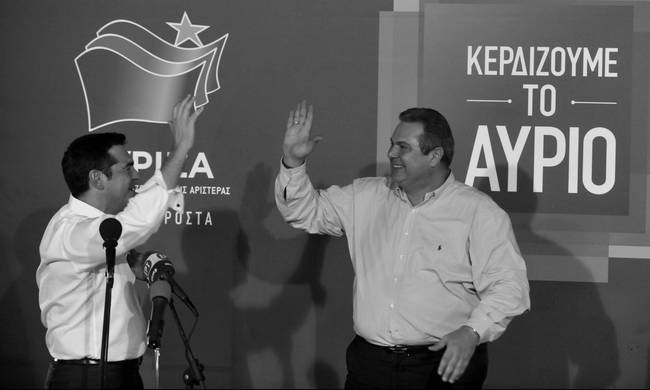Defence Minister Kammenos’ doublespeak drives his party to political oblivion
By Alec Mally, New Europe
The ratification process for the Prespes Agreement, signed by Greece and Macedonia/FYROM last June in attempt to resolve the Name Dispute between them, rolls steadily forward in Skopje. That country’s parliamentary speaker estimates the entire procedure will be complete by January 15, 2019 when the final vote takes place, itself still an open question, but highly likely to succeed. In Greece’s tense pre-election atmosphere, even though no national election dates are officially announced, Skopje’s announcement establishes a critical marker, most probably framing the final days of the current Greek government coalition between the leftist SYRIZA party and the hard-right Independent Greeks (ANEL) party that has ruled Greece since January 2015.
President of the ANEL party, Defense Minister Panos Kammenos, spent most of this past week laying out his party’s current position concerning the vote for the Prespes Agreement ratification, but succeeded in confusing his audience with a range of deeply conflicting statements that leave most Greek voters convinced his increasingly meaningless ramblings-on about his party’s anti-Prespes views are just a crude attempt to remain in power a few months longer, instead of using his small party, working with the opposition, to block the Prespes deal ratification process in the Greek parliament and to support a no-confidence vote aimed at SYRIZA policies that would result in early national elections.
Kammenos succeeds in deceiving all takers
Whether it’s a coordinated strategy or just this season’s newest tactic designed to deceive, this week’s public remarks by Kammenos on the Prespes Agreement have succeeded in confusing local political analysts as well as his coalition allies and political opponents. In the past days he has made some of the following points:
–The ANEL Party will vote against the Prespes Agreement when it comes through the Greek parliamentary ratification process.
–The ANEL Party has decided it will not support any no-confidence motion against its coalition with SYRIZA, even if this is once again raised, as it was last June, in connection with the ratification of the Prespes Agreement. (The June no-confidence vote was taken, and failed, to block the actual signature).
–Kammenos declared he will resign, and the ANEL party will cease participation in Greek ratification procedures as soon as Prime Minister Zoran Zaev’s government in Skopje completes the ratification process (December 13, 2018). He tried to walk this back later in the day, but only did so partially and changed his resignation date to the date of arrival of the agreement in the Greek parliament, after receiving multiple calls from his SYRIZA allies.
(and much earlier this year)
–There is absolutely no chance the government in Macedonia/FYROM will successfully complete the Prespes Agreement ratification procedures, so it will never reach the Greek Parliament for action.
Highway to political oblivion
Most of the recent voter polls taken in Greece offer little cheer for ANEL’s future, with the party consistently failing to gather the 3% minimum of the popular vote needed to obtain a seat in parliament, under Greece’s confusing reinforced proportional representation electoral system. Unless something changes dramatically, and ANEL is seen to take a forceful, unified stand opposing the Prespes Agreement instead of simply sidestepping the process and letting independent MPs and other small parties (in ANEL’s place) carry the ball with SYRIZA to ensure the ratification succeeds, the party itself is heading for the exit door. This is the conundrum Kammenos faces, even though most polls show a convincing victory for the not ideologically dis-similar center right New Democracy party whenever the next Greek parliamentary elections are held.
Amendments satisfactory
The sometimes-problematic ongoing process of amending the constitution in Macedonia/FYROM is expected to be completed by January 15, 2019, according to Speaker Talat Xhaferi. Athens has been paying close attention to the amendments, and has signaled that the latest draft amendments, which now refer to the “diaspora” instead of the problematic (for Athens) term “Macedonian people living in neighboring countries” is satisfactory in that it parallels language used in similar references in the Greek constitution.



















